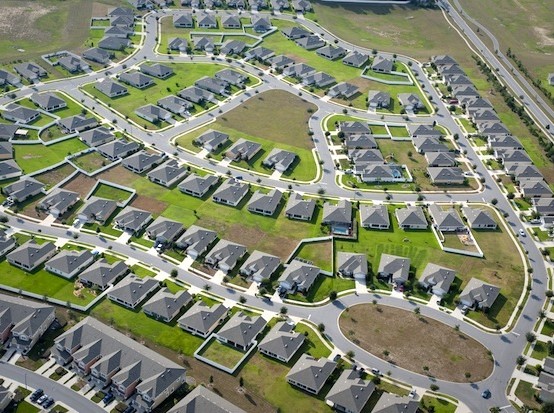Sprawl in Durham: Part One - Why is Sprawl Bad?
This post is part one of a two-part series on sprawl and housing affordability in Durham. Today, we are looking at the problem and in two weeks, we will explore Durham's proposal to address sprawl and missing middle housing.
Across the country, we have started to realize that we have made a mistake. Our cities have become too sprawling. Cities with expansive suburban, low-density areas (too few people living on too much land) see all sorts of problems. Below are just a few of the issues:
- So much driving! - When cities are spread out, it means people have to drive longer distances in many different directions. This is bad for the environment, traffic congestion, and productivity.
- Much higher costs for cities - Imagine a water pipe that runs a mile and serves thousands of households in a city. Compare that to a water pipe that runs 7 miles just to serve a handful of single family homes out in the suburbs. Which is more costly per household? Now, add a similar cost for trash services, police and fire, electricity, roads, and every other service that the city provides that requires physical infrastructure. Cities across the country are struggling with financial issues because of sprawl.
- Equity and Access - The more spread out we are, the less likely that we will be able to get public transportation to every neighborhood. Those who can't afford car ownership (or owning multiple cars) are out of luck. Even those that do have a car must spend more money on gas because they're driving further distances. It's a catch-22 because the homes that low-income residents can afford are far away from downtown, but the further away you get from downtown, the more driving you have to do and the less you are served by good public transit.
- EXPENSIVE HOUSING - we have a finite amount of land in Durham. If there are a relatively small number of people living on big plots of land, you run out of room in growing cities like ours. This leads to a shortage of housing and that drives costs way up. I don't have to tell anyone reading this post that housing prices are a problem in Durham right now.
Of course, those are just a handful of the issues. One of the biggest reasons cities have seen so much sprawl is self-inflicted: zoning laws. We tell people that they can only build single-family homes on the majority of land around Durham. As a result, residents are unable to build dense, walkable neighborhoods and Durham, like so many other U.S. cities, sprawls outward.
Fortunately, Durham leadership now understands this problem and is looking towards a better future. A while back, they relaxed zoning restriction downtown and started to encourage dense development. But with 20-30 people moving to Durham every day, is this really enough? We can't cram everyone into downtown. Neighborhoods outside of the downtown area are going to have to grow and change as well.
Neighborhoods outside of downtown? You mean those residential streets with single family homes?As soon as you start talking about those areas, homeowners start to push back.
Homeowners are often worried about allowing too many new people in their neighborhood. They worry about traffic congestion, "neighborhood character" (I put that in quotes because sometimes this is veiled racism/classism), and most of all, they worry about the value of their house. It's hard to fault homeowners for protecting the value of their house. They spent money on it and probably have a mortgage. They are doing what is best for themselves and their families (more on this in a future post). Additionally, while historic overlays have value, they prevent density and promote sprawl. The positive side is that they preserve the identity and uniqueness of Durham. But they also limit housing options and keep prices high.
So with politically powerful groups of citizens opposing high-density development, the feasible option (and perhaps the most prudent option financially), seems to be small, incremental changes. Durham wants to roll up its sleeves and implement policies, bit by bit, to make the city better in the long run. We will take a look at how Durham proposes to accomplish this in the next post!
For now, happy holidays!


